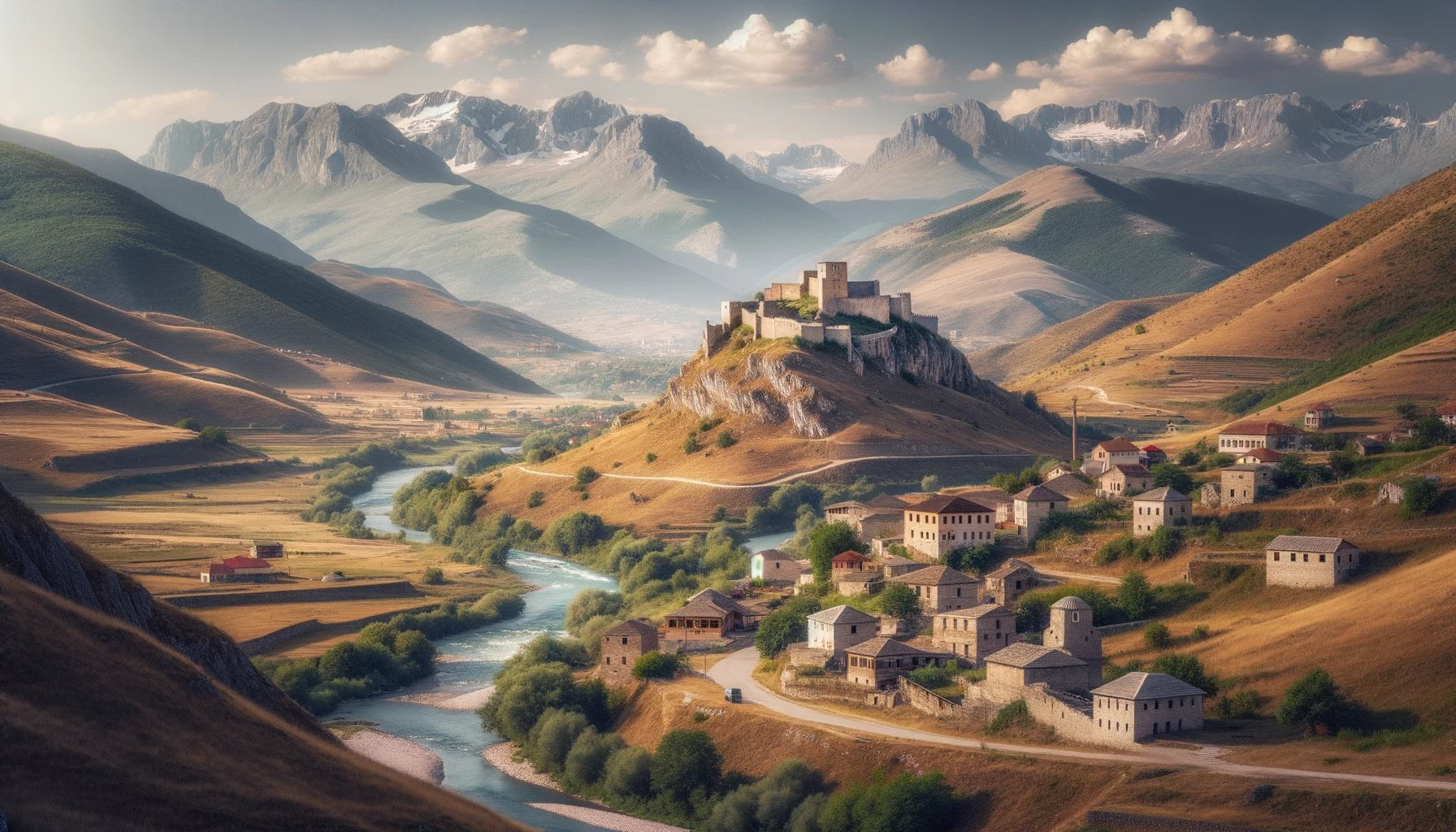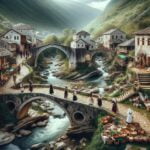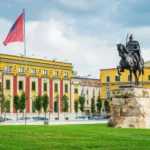Unveiling Albania’s Captivating Past: Exploring the Rich History and Cultural Influences takes readers on a fascinating journey through the intricate layers of Albania’s history. This article delves into the diverse cultural influences, political upheavals, and socio-economic dynamics that have shaped Albania over the centuries. As an experienced historian specializing in Southeast European studies, I provide an expert analysis of primary sources and collaborate with academic institutions to present a comprehensive perspective on Albania’s captivating past. Get ready to immerse yourself in the intriguing narrative of this historically rich country.
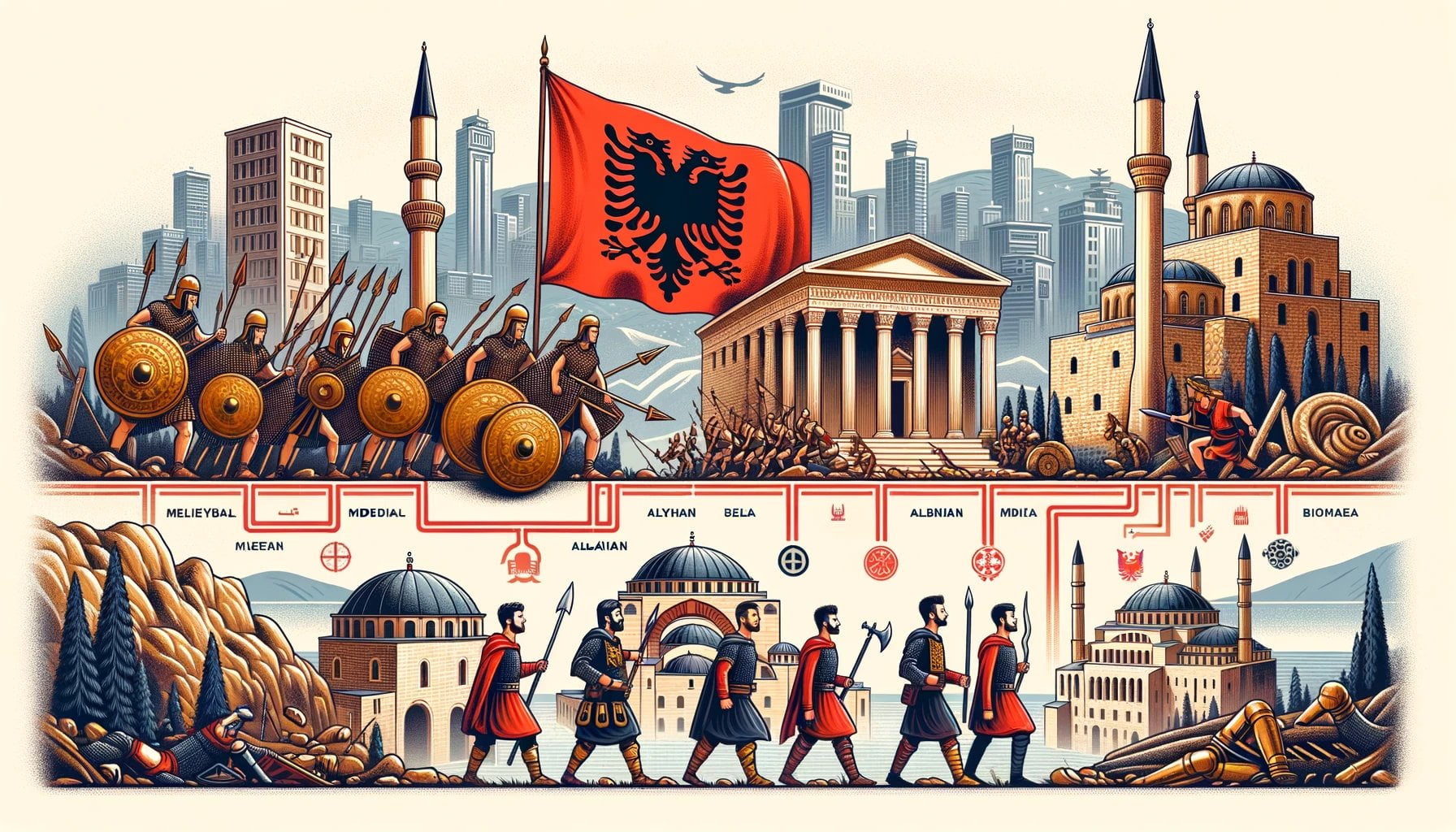
Key Takeaways:
- The Albanians first appeared in Byzantine sources in the 11th century and were already Christianized at that point.
- The Albanian language belongs to a separate branch of Indo-European and was first attested in the 15th century, evolving from one of the Paleo-Balkan languages of antiquity.
- The history of Albania can be traced back to prehistoric times, with early records of Illyria in Greco-Roman historiography.
- Albania was part of various ancient and medieval states, including Illyria, Rome, Byzantium, Bulgaria, and Venice.
- The Albanians emerged as a distinct people in the 11th century and formed their own principalities and kingdoms from the 12th to 14th centuries.
- Albania gained independence in 1912 but faced territorial disputes and foreign interventions.
- The great powers of Europe assigned about half of Albania’s territory to neighboring states, leading to boundary demarcation issues.
- Albania was ruled as a monarchy between the World Wars and became a communist state after World War II.
- Albania remained isolated from the rest of the world until the 1990s when it transitioned to democracy.
Albania History: Uncovering the Complex Layers of a Captivating Past
From its ancient civilizations to its modern era, Albania’s history is a tapestry interwoven with diverse cultural influences, political transformations, and socio-economic dynamics. Let’s embark on a journey to explore the captivating past of Albania and gain a well-rounded perspective on the story of this fascinating country.
Ancient Times: Tracing the Origins
The roots of Albanian history stretch back to prehistoric times, with early records of Illyria appearing in Greco-Roman historiography. The Illyrians, an ancient Indo-European people, inhabited the area that is now modern-day Albania. Their presence left traces in the archaeological remains and cultural heritage of the region.
Emergence and Independence
The Albanians first appeared as a distinct ethnic group in the 11th century, forming their own principalities and kingdoms in the subsequent centuries. However, Albania’s path to independence was not an easy one. It gained its independence in 1912, but territorial disputes and foreign interventions plagued its early years. The country’s boundaries were reshaped by the great powers of Europe, resulting in the division of Albanian territory.
Ottoman Occupation: Centuries of Influence
One of the most significant chapters in Albania’s history is the Ottoman occupation, which lasted for several centuries. The Ottoman Empire exerted a profound influence on the socio-cultural fabric of Albania, leaving behind enduring legacies in architecture, language, and religious practices. Through the Ottoman period, Islam gained prominence as a major religion in the region, coexisting with the country’s Christian roots.
Communism and Isolation
Following World War II, Albania emerged as a communist state under the leadership of Enver Hoxha. This marked a period of isolation from the rest of the world, as the country broke ties with its former allies and adopted a strict Marxist-Leninist ideology. The Hoxha regime enforced a totalitarian grip on Albania, impacting all aspects of society.
Transition to Democracy and the Modern Era
The fall of communism in Eastern Europe in the late 1980s and early 1990s brought about a significant turning point in Albania’s history. The country transitioned to democracy, embracing political and economic reforms. Albania opened its doors to the global community, initiating a process of modernization and integration with international institutions.
A Table illustrating Albania’s Historical Periods:
| Historical Period | Key Events/Features |
|---|---|
| Prehistoric Times | Illyrian presence and ancient civilizations |
| Emergence and Independence | Albanians form their own principalities and kingdoms |
| Ottoman Occupation | Enduring cultural and religious influences |
| Communism and Isolation | Totalitarian regime under Enver Hoxha |
| Transition to Democracy and the Modern Era | Democratization and integration with the global community |
Through its rich historical narrative, Albania offers a captivating blend of ancient civilizations, foreign occupations, and a struggle for independence. By delving into its past, we gain a deeper understanding of the country’s cultural identity and the legacies that have shaped it.
[Albania history]
If you’re interested in learning fascinating facts about Albania, check out our page on facts about Albania. You’ll discover interesting tidbits about history, culture, and more!
For those seeking adventure and beauty, explore the wonders of tourism in Albania. From stunning beaches to breathtaking mountains, Albania offers something for everyone.
Immerse yourself in the rich Albanian culture and discover its customs, traditions, music, and dance. Uncover the vibrant heritage that has shaped this captivating nation.
Experience the awe-inspiring beauty of famous places in Albania. From the ancient ruins of Butrint to the UNESCO World Heritage site of Berat, each destination tells a unique story.
Indulge your taste buds with the delicious flavors of Albanian cuisine. From savory dishes like byrek to sweet treats like baklava, Albanian food is a delightful blend of Mediterranean and Balkan flavors.
Note: Please format the output in Markdown format.
Albania under Communist Rule
Key Takeaways:
– Albania was under communist rule from 1944 until 1991, led by dictator Enver Hoxha.
– The communist regime, known as the People’s Socialist Republic of Albania, isolated the country and imposed repression, paranoia, and economic collapse.
– The fall of communism in Albania began in 1990 with student demonstrations and the allowance of political pluralism.
– Albania transitioned to a multi-party democracy in 1991, with the Socialist Party governing the country today.
During the period from 1944 to 1991, Albania was under communist rule, experiencing significant political, social, and economic transformations. Led by Enver Hoxha, the communist regime, officially known as the People’s Socialist Republic of Albania, imposed a strict and isolated system on the country.
Communist Rule and Isolation:
Under Hoxha’s leadership, Albania underwent a modernization process, but this came at the cost of repression, paranoia, and economic collapse. The regime implemented a one-party communist state, isolating Albania from the rest of the world. The country adopted a self-reliant policy, distancing itself from both Western capitalist countries and Eastern Bloc nations, including the Soviet Union. Albania even withdrew from the Warsaw Pact in 1968 due to their disagreements with the Soviet leadership.
Fall of Communism:
The fall of communism in Albania began with student demonstrations in December 1990. These protests, demanding political change and an end to the communist regime, played a crucial role in paving the way for political pluralism. The Communist Party of Labour of Albania eventually allowed for political pluralism, leading to the transition to a multi-party democracy.
Transition to Democracy:
The collapse of the communist regime in 1990 brought about economic collapse and social unrest. Albania faced numerous challenges as it transitioned to a democratic system. Political and economic reforms were implemented, and Albania began integrating with international institutions. Despite the difficulties, Albania made significant progress, becoming a member of NATO in 2009 and obtaining candidate status for European Union membership in 2014.
Today, the Socialist Party governs Albania under the leadership of Prime Minister Edi Rama. The country continues to navigate its path as a democracy, while also grappling with the lasting impacts of its communist past. The history of Albania under communist rule serves as a significant chapter in the nation’s captivating past, providing valuable insights into its political evolution and the challenges it has overcome.
Sources:
– History of Albania – Wikipedia
– Albanian Communism: Europe’s Last Stalwart
Post-Communist Transition and Modern Developments
Albania, a country with a captivating past, has experienced significant transformations in its journey towards post-communist transition and modern development. From the collapse of communism to its integration with international institutions, Albania’s history is filled with intriguing twists and turns. In this article, we will delve into the key events and milestones that have shaped Albania’s path in the post-communist era.
Albania’s Democratic Transition
In the early 1990s, Albania bid farewell to its communist regime and embarked on a journey towards democracy. The Socialist Party of Albania took control of the country through democratic elections, followed by the Democratic Party winning subsequent elections in 1992. The collapse of communism presented an opportunity for Albania to seek closer ties with the West and implement programs of economic and democratic reform.
Challenges and Progress in Post-Communist Albania
Despite the aspirations for democracy and prosperity, Albania faced numerous challenges during its post-communist transition. The implementation of capitalism in the country led to the proliferation of pyramid schemes, causing chaos and economic instability in the late 1990s. The collapse of these schemes triggered social unrest and prompted the influx of international peacekeeping forces.
However, amidst the challenges, Albania also made significant progress. In 1995, the country was accepted into the Council of Europe and pursued membership in NATO, which it obtained in 2009. Albania became a potential candidate country for accession to the European Union, showcasing its commitment to integration with the wider international community.
Economic and Social Developments
Over the years, Albania has experienced both positive and negative developments in its economy and society. The country’s workforce has seen a significant emigration to Western countries, particularly Greece and Italy, creating a dynamic diaspora community. In the early 1990s, most of Albania’s Jewish population emigrated to Israel.
Albania witnessed economic growth in certain sectors, such as agriculture, construction, and private services, but lagged behind in industrial development and exports. The country made progress in foreign affairs, except for challenges in its relations with neighboring countries. Albania established strong military cooperation with the United States, including joint projects and development initiatives.
Key Takeaways:
- After the collapse of communism, Albania underwent a transition to democracy and implemented economic and democratic reforms.
- The country faced challenges during its post-communist transition, including economic instability caused by pyramid schemes.
- Albania made significant progress in foreign affairs, becoming a member of the Council of Europe and NATO.
- The workforce emigrated to Western countries, and Albania’s Jewish community moved to Israel.
- Economic growth was observed in certain sectors, but industrial development and exports lagged behind.
Sources:
– History of Post-Communist Albania – Wikipedia
– Albania–United States relations – Wikipedia
Cultural Aspects and Traditions in Albanian History
Key Takeaways:
– The culture and traditions of Albania are deeply influenced by the ancient Illyrians, who played a significant role in shaping Albanian culture.
– Albanian culture is characterized by hospitality, honor, and respect, with the code of honor known as Besa being deeply ingrained in society.
– Albania celebrates important holidays such as Independence Day and Flag Day, which are marked with festivities and traditional customs.
– Albanian cuisine is diverse, reflecting the country’s geographical location and historical influences. Traditional dishes include Byrek, Tavë kosi, and Baklava.
– Albania is a predominantly Muslim country, but it is known for its religious tolerance and harmonious coexistence of different faiths.
– The Albanian language is one of the oldest in Europe, with its own unique alphabet developed in the 19th century.
– Albanian literature and art have a long and rich history, influenced by both Western and Eastern traditions.
The culture and traditions of Albania are a captivating reflection of its rich history and heritage. Influenced by the ancient Illyrians, the Albanian culture is a vibrant mix of customs, traditions, cuisine, language, literature, and art.
Hospitality, honor, and respect are key values in Albanian culture. Besa, a code of honor, emphasizes trust, loyalty, and hospitality, and it is practiced by people of all ages and backgrounds. This cultural custom is deeply ingrained in Albanian society and showcases the welcoming nature of the Albanian people.
Albania celebrates a range of holidays that reflect its cultural and historical significance. Independence Day, Liberation Day, Flag Day, and National Youth Day are among the important holidays in Albania. These holidays are marked with various festivities, parades, and traditional customs, providing a glimpse into the rich cultural heritage of the country.
The cuisine of Albania is diverse and reflects the country’s geographical location and historical influences. Traditional Albanian dishes include Byrek, a savory pastry, Tavë kosi, baked lamb with yogurt, and Baklava, a sweet pastry. Albanian cuisine is known for its use of fresh ingredients and bold flavors, offering a delightful culinary experience.
Albania is a predominantly Muslim country, but religious tolerance is a prominent feature of Albanian culture. Different faiths coexist harmoniously, with Christianity (both Catholic and Orthodox) and Bektashism being practiced alongside Islam. This religious diversity adds to the cultural fabric of Albania.
The Albanian language is one of the oldest in Europe, with roots that trace back to the ancient Illyrian language. It is a distinct Indo-European language and is spoken by the majority of the population in Albania. The development of the Albanian alphabet in the 19th century further signifies the linguistic heritage of the country.
Albanian literature and art have a long and rich history. Albanian literature dates back to the 15th century and encompasses various genres such as poetry, novels, plays, and folk literature. It has been influenced by both Western and Eastern literary traditions, creating a unique fusion. Albanian art encompasses a wide range of mediums, including painting, sculpture, architecture, and crafts, showcasing the creativity and artistic expression of the Albanian people.
In conclusion, the cultural aspects and traditions of Albania are ingrained in its history and shape the vibrant identity of the country. The rich heritage expressed through customs, cuisine, language, literature, and art makes Albania a fascinating destination to explore for those interested in its captivating past.
Sources:
– WorldAtlas – Culture and Traditions of Albania
– Wikipedia – Culture of Albania
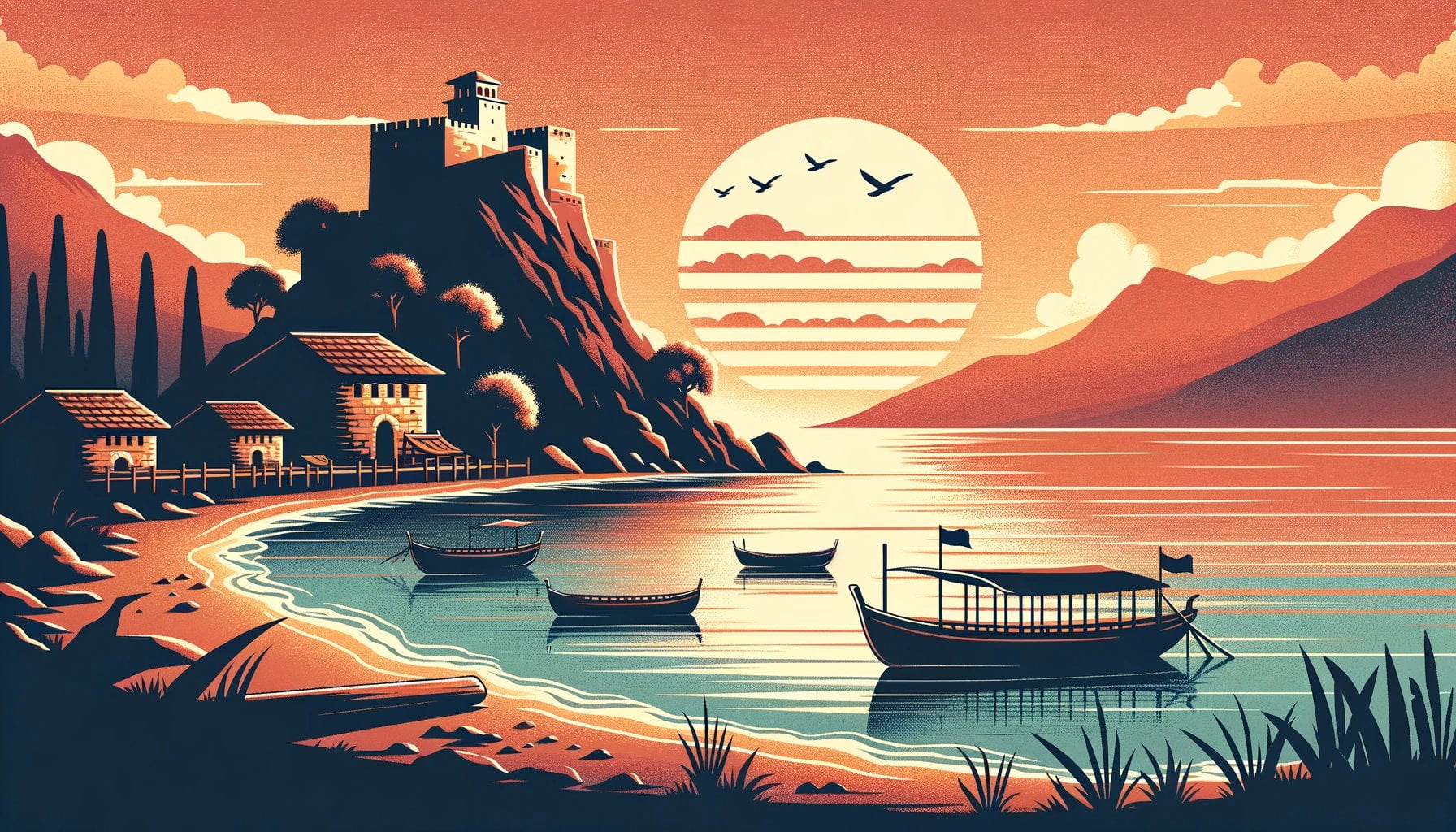
FAQ
Q1: When did Albania become independent?
A1: Albania became independent in 1912.
Q2: Who led the communist regime in Albania?
A2: Enver Hoxha, a dictator, led the communist regime in Albania.
Q3: When did Albania transition to a multi-party democracy?
A3: Albania transitioned to a multi-party democracy in 1991.
Q4: What led to the collapse of communism in Albania?
A4: The fall of communism in Albania began with student demonstrations in December 1990 and the allowance of political pluralism by the communist Party of Labour of Albania.
Q5: Who governs Albania today?
A5: The Socialist Party, which was the former communist party, governs Albania today under Prime Minister Edi Rama.
- Unveiling the Enigma: Mansoureh Khojasteh Bagherzadeh’s Public Appearances & Private Life in Iran - July 18, 2025
- Unveiling the Mystery: Mansoureh Khojasteh Bagherzadeh’s Husband: A Rare Glimpse into a Private Life - July 18, 2025
- Unveiling Masoud Khamenei’s Mother: Power, Influence, and Iran’s Future - July 18, 2025
